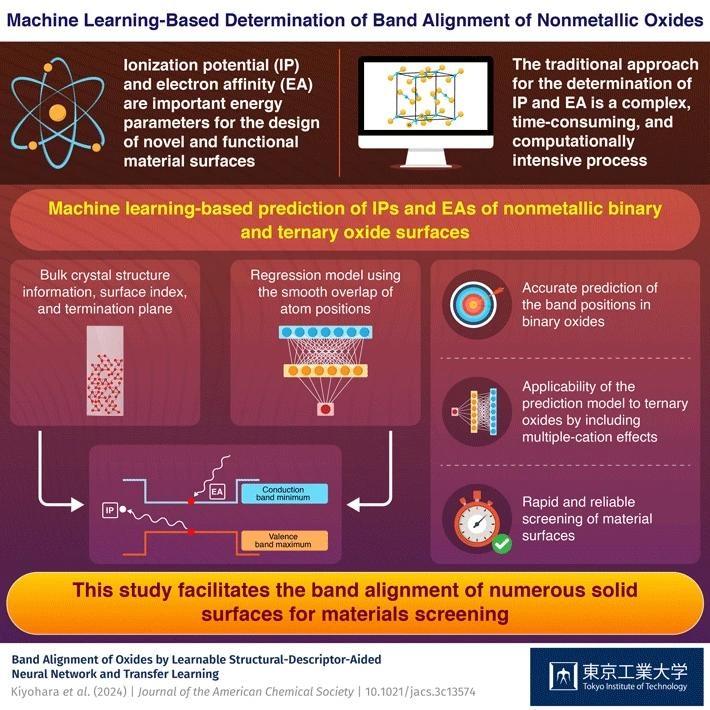Scientists at Tokyo Tech have demonstrated how machine learning (ML) makes it possible to compute the fundamental electronic properties of binary and ternary oxide surfaces accurately and efficiently. Other compounds and attributes could be included in their ML-based model. The results of this study have applications in both the creation of functional materials and the screening of material surface properties.

Image Credit: Tokyo Institute of Technology
A thorough examination of new materials' atomic and electronic structures is necessary for their design and development to produce materials with superior characteristics.
Important details about the electronic band structure of semiconductor, insulator, and dielectric surfaces can be found by examining electron energy parameters like electron affinity (EA), which is the amount of energy released when an electron attaches to the conduction band minimum, and ionization potential (IP), which is the energy required to remove an electron from the valence band maximum.
If their IPs and EAs can be accurately estimated, such nonmetallic materials can be used as functional surfaces and interfaces in photosensitive devices and optoelectronic equipment.
IPs and EAs rely heavily on surface structures, which complicates the already complex process of quantifying them. The bulk and surface systems are independently quantified in precise first-principles calculations used in the traditional computation of IPs and EAs. For many surfaces, this laborious technique makes it impossible to quantify IPs and EAs, therefore computationally efficient methods must be used instead
Under the direction of Professor Fumiyasu Oba, a group of scientists from the Tokyo Institute of Technology (Tokyo Tech) has shifted their attention to machine learning (ML) to tackle the wide-ranging problems that impact the measurement of IPs and EAs of nonmetallic solids. The Journal of the American Chemical Society has published their study findings.
In recent years, ML has gained a lot of attention in materials science research. The ability to virtually screen materials based on ML technology is a very efficient way to explore novel materials with superior properties. Also, the ability to train large datasets using accurate theoretical calculations allows for the successful prediction of important surface characteristics and their functional implications.
Fumiyasu Oba, Professor, Tokyo Institute of Technolog
The researchers used the smooth overlap of atom positions (SOAPs) as numerical input data to create a regression model using an artificial neural network. Their model effectively and precisely predicted the IPs and EAs of binary oxide surfaces by employing the data on bulk crystal structures and surface termination planes.
Furthermore, the ML-based prediction model might ‘transfer learning,’' which is the process of modifying a model built for a specific purpose to absorb fresh datasets and reapplying it to different tasks. The scientists included the impacts of several cations into their model by creating ‘learnable’ SOAPs and predicted the IPs and EAs of ternary oxides using transfer learning.
“Our model is not restricted to the prediction of surface properties of oxides but can be extended to study other compounds and their properties,” Oba concluded.
Journal Reference:
Kiyohara, S., et. al. (2024) Band Alignment of Oxides by Learnable Structural-Descriptor-Aided Neural Network and Transfer Learning. Journal of the American Chemical Society. doi:10.1021/jacs.3c13574